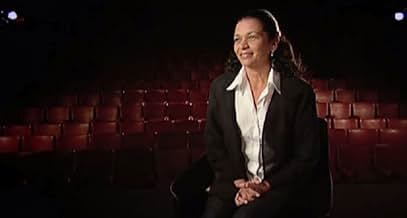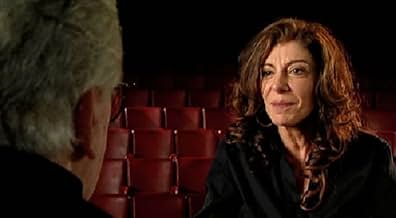AVALIAÇÃO DA IMDb
8,4/10
1,5 mil
SUA AVALIAÇÃO
Após um anúncio de jornal, as mulheres comuns contam parte das suas histórias de vida ao director Eduardo Coutinho, que são depois recriadas pelas atrizes, esbatendo os limites entre verdade... Ler tudoApós um anúncio de jornal, as mulheres comuns contam parte das suas histórias de vida ao director Eduardo Coutinho, que são depois recriadas pelas atrizes, esbatendo os limites entre verdade, ficção e performance.Após um anúncio de jornal, as mulheres comuns contam parte das suas histórias de vida ao director Eduardo Coutinho, que são depois recriadas pelas atrizes, esbatendo os limites entre verdade, ficção e performance.
- Prêmios
- 11 vitórias e 6 indicações no total
Avaliações em destaque
PASSIONATE for documentaries by Eduardo Coutinho, marathon at #SecEmCasa, here we have a peculiar example of life stories, beautiful, overcoming, suffering, and the way of interpretation, alternating the real personal and the fictional character, magnificently interpreted, very well directed and produced by the filmmaker, a scene, some characters, many stories, bathed in tears and determination, strong women, intense testimonies, teenage pregnancy, tense...
Just when Eduardo Coutinho's (semi)documentaries seemed to have become uncomfortably predictable -- when his personalist, inquisitive, biased, "screw-impartiality" style seemed to take over whatever reality he was investigating at the time -- "Jogo de Cena" arrives to show us that, at 74, he has found extra breath and is at the top of his game.
I have little to add to blur4fun spot-on comment here, except to say this is one of the wittiest formalist exercises on film structure in recent memory. It proves that imagination and intelligence can make seemingly ordinary material -- life stories told (or enacted) by women who may or may not be actresses -- rise to puzzling metalinguistic heights when cleverly rearranged and interconnected. It's also a well-humored investigation about the elastic boundaries of the eternal "truth or artifice" issue in the documentary form.
At first, what we see on the screen seems to belong to daytime TV slice-of-life talk-shows: people spilling out their personal dramas and tragedies. But, as in Jean Rouch's partly fake "Chronique d'un Été" and Orson Welles's landmark faux-documentary "F for Fake" (both seem to be influential here), somewhere along the way, we become mind- boggled: is that a "real life" woman or an actress? Who's the real "owner" of that life story? What is more important, to believe in the story or in the person who's telling it? Does the fact of suddenly realizing someone is acting out (and fooling us) prevent us from being moved by that story? Why do we take for granted that certain "formats" present the truth, like documentaries and one-on-one interviews?
By the end of "Jogo de Cena" (the title aptly refers to the theatrical world of make believe, and it's not by chance the single set is an empty stage), we realize -- with a smile -- that we've been had, and, though the film is strictly realistic in its visual style, it's a journey that can be as rich and fun as letting your mind be bent by a Cortázar story, a Robbe-Grillet novella, a Buñuel film or an Escher drawing.
"Jogo de Cena" comes out in the same year as remarkable Brazilian films like "Proibido Proibir", "Santiago", "O Ano em que Meus Pais Saíram de Férias", "Mutum", "Cidade dos Homens", "Saneamento Básico"; controversial ones like "Baixio das Bestas", "Cão sem Dono", "Estômago", "O Cheiro do Ralo", besides the box-office bulldozer (and winner of the Berlin Golden Bear) "Tropa de Elite". In the future, 2007 will have to be remembered as a very special year for Brazilian cinema.
I have little to add to blur4fun spot-on comment here, except to say this is one of the wittiest formalist exercises on film structure in recent memory. It proves that imagination and intelligence can make seemingly ordinary material -- life stories told (or enacted) by women who may or may not be actresses -- rise to puzzling metalinguistic heights when cleverly rearranged and interconnected. It's also a well-humored investigation about the elastic boundaries of the eternal "truth or artifice" issue in the documentary form.
At first, what we see on the screen seems to belong to daytime TV slice-of-life talk-shows: people spilling out their personal dramas and tragedies. But, as in Jean Rouch's partly fake "Chronique d'un Été" and Orson Welles's landmark faux-documentary "F for Fake" (both seem to be influential here), somewhere along the way, we become mind- boggled: is that a "real life" woman or an actress? Who's the real "owner" of that life story? What is more important, to believe in the story or in the person who's telling it? Does the fact of suddenly realizing someone is acting out (and fooling us) prevent us from being moved by that story? Why do we take for granted that certain "formats" present the truth, like documentaries and one-on-one interviews?
By the end of "Jogo de Cena" (the title aptly refers to the theatrical world of make believe, and it's not by chance the single set is an empty stage), we realize -- with a smile -- that we've been had, and, though the film is strictly realistic in its visual style, it's a journey that can be as rich and fun as letting your mind be bent by a Cortázar story, a Robbe-Grillet novella, a Buñuel film or an Escher drawing.
"Jogo de Cena" comes out in the same year as remarkable Brazilian films like "Proibido Proibir", "Santiago", "O Ano em que Meus Pais Saíram de Férias", "Mutum", "Cidade dos Homens", "Saneamento Básico"; controversial ones like "Baixio das Bestas", "Cão sem Dono", "Estômago", "O Cheiro do Ralo", besides the box-office bulldozer (and winner of the Berlin Golden Bear) "Tropa de Elite". In the future, 2007 will have to be remembered as a very special year for Brazilian cinema.
Eduardo Coutinho (1933 - 2014) is a very famous name in Brazil. He is considered the best in the documentary genre in the country. Therefore, I was really eager to watch something he made.
The funny thing is that when we hear such things we expect something complex. But his greateness, at least with Jogo de Cena (2007), relies in the simplicity... I'm not gonna talk about Cinematography, Soundtrack... What matters in the movie are the stories and the acting.
"The production company published a small newspaper ad asking women over 18 in Rio de Janeiro to tell their life stories for a documentary. " Some women were selected and told their life stories to the director and his crew. Then Jordana Berg edited the best parts, comic, dramatic and tragic ones, a fantastic work.
It's mind blowing to realize ordinary women have very interesting stories. The stories are very funny or very touching. Knowing they are real makes them much more special and meaningful. It's a fantastic experience to enter a life like that, to know the best and the worst about somebody's life. Watching it in some point I thought: "wow! When I'm walking on the streets I'm around women who are single mothers, who lost someone special, maybe the week before we cross each others way and I'll never know it... And they will never know what I've been through either..." But Coutinhos' geniality pushes this documentary to a even higher standard.
He invited actresses to perform the stories. So there are the real women talking and actresses performing. Some are very well known in Brazil, so I knew they were acting, but some I didn't know, so I couldn't separate the actresses from the real women.
That's why the title is "Jogo de Cena". It's a theater game.
So this documentary is about challenging actresses, bringing to light ordinary women, real stories, real problems and showing how we know nothing about almost no one and that we are not alone when we feel joy or pain, everybody does. A must-see that will probably have more impact in women but that will be very interesting and important for men too.
The funny thing is that when we hear such things we expect something complex. But his greateness, at least with Jogo de Cena (2007), relies in the simplicity... I'm not gonna talk about Cinematography, Soundtrack... What matters in the movie are the stories and the acting.
"The production company published a small newspaper ad asking women over 18 in Rio de Janeiro to tell their life stories for a documentary. " Some women were selected and told their life stories to the director and his crew. Then Jordana Berg edited the best parts, comic, dramatic and tragic ones, a fantastic work.
It's mind blowing to realize ordinary women have very interesting stories. The stories are very funny or very touching. Knowing they are real makes them much more special and meaningful. It's a fantastic experience to enter a life like that, to know the best and the worst about somebody's life. Watching it in some point I thought: "wow! When I'm walking on the streets I'm around women who are single mothers, who lost someone special, maybe the week before we cross each others way and I'll never know it... And they will never know what I've been through either..." But Coutinhos' geniality pushes this documentary to a even higher standard.
He invited actresses to perform the stories. So there are the real women talking and actresses performing. Some are very well known in Brazil, so I knew they were acting, but some I didn't know, so I couldn't separate the actresses from the real women.
That's why the title is "Jogo de Cena". It's a theater game.
So this documentary is about challenging actresses, bringing to light ordinary women, real stories, real problems and showing how we know nothing about almost no one and that we are not alone when we feel joy or pain, everybody does. A must-see that will probably have more impact in women but that will be very interesting and important for men too.
10sltfilho
After an ad placed on the newspaper, Eduardo Coutinho, the director, listens to stories of ordinary women. Actresses play the same stories, alternatively.
With a simple premise, the public is invited to see more than meets the eye. The real-life women shows us such a richness of detalis, strong personalities and delicate ways of perceiving the world. The actresses find difficulty on containing the emotions that the real character didn't even show on the speech. And suddenly the audience is challenged to figure out what is reality and what is interpretation on a thin line between life and art - as no other work is usually able to show us.
When comparing real life and interpretation, we come to our senses that everything is, indeed, interpretation. No matter if as past experiences or a script offered by the director, emotions are always emotions and we find ourselves flowing on the realms of speech.
A surprising masterpiece on both art and life, that amazes, moves and puzzles us. Coutinho again shows us that a simple idea is able to bring us deep experiences - especially with the unseen beauty there is right in front of us.
With a simple premise, the public is invited to see more than meets the eye. The real-life women shows us such a richness of detalis, strong personalities and delicate ways of perceiving the world. The actresses find difficulty on containing the emotions that the real character didn't even show on the speech. And suddenly the audience is challenged to figure out what is reality and what is interpretation on a thin line between life and art - as no other work is usually able to show us.
When comparing real life and interpretation, we come to our senses that everything is, indeed, interpretation. No matter if as past experiences or a script offered by the director, emotions are always emotions and we find ourselves flowing on the realms of speech.
A surprising masterpiece on both art and life, that amazes, moves and puzzles us. Coutinho again shows us that a simple idea is able to bring us deep experiences - especially with the unseen beauty there is right in front of us.
Você sabia?
- CuriosidadesThe production company published a small newspaper ad asking women over 18 in Rio de Janeiro to tell their life stories for a documentary. 83 women answered the ad, 23 of them were selected and their interviews were filmed in June 2006 on the stage of Glauce Rocha Theater in Rio. In September, a few actresses re-enacted the interviews and commented on their approach, difficulties and doubts.
- ConexõesFeatured in Eduardo Coutinho, 7 de Outubro (2013)
Principais escolhas
Faça login para avaliar e ver a lista de recomendações personalizadas
Detalhes
Bilheteria
- Faturamento bruto mundial
- US$ 226.783
- Tempo de duração1 hora 40 minutos
- Cor
- Mixagem de som
- Proporção
- 1.66 : 1
Contribua para esta página
Sugerir uma alteração ou adicionar conteúdo ausente

Principal brecha
By what name was Jogo de Cena (2007) officially released in Canada in English?
Responda



















